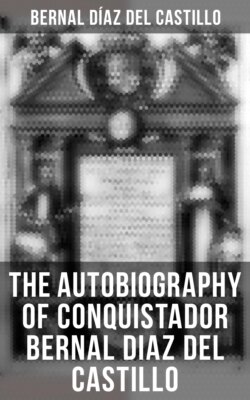Читать книгу The Autobiography of Conquistador Bernal Diaz del Castillo - Bernal Diaz del Castillo - Страница 62
На сайте Литреса книга снята с продажи.
CHAPTER LV.
ОглавлениеTable of Contents
How Diego Velasquez is informed by his agents that we had sent messengers with letters and presents to our king, and what further took place.
Diego Velasquez received intelligence of everything we had done, partly by the letters which had been secretly conveyed to him, and were said to be of Montejo's own writing, and partly from the sailor, who swam on shore for that purpose. When he heard of the valuable present which we sent to his majesty, and of the agents we had selected for the purpose, he grew excessively angry, and threw out the most heavy curses against Cortes, against his own private secretary Duero, and the treasurer Almador de Lares. He then immediately ordered two small but very swift sailing vessels to be fitted out, and furnished with as great a number of men and firearms as could be got together at the moment. These vessels were given in command of two officers named Gabriel de Rojas and Guzman, who were ordered to repair to the Havannah, and to capture the vessel which conveyed our agents and the gold.
Both vessels arrived, after two days' sail, in the Bahama roads, and made every inquiry of the fishermen and coasters whether they had seen a ship of considerable tonnage pass that way. All the accounts they received went to show that she must have left the roads, as the wind had constantly been favorable: they, therefore, tacked up and down a considerable time, but, discovering no trace of her, they returned to Santiago.
If the first accounts had made Diego Velasquez dispirited, he was now the more so when he found the ship had escaped. His friends now advised him to send some one to Spain to lay his complaints before the president of Indian affairs, with whom he stood in great favour. Velasquez also laid a formal accusation against Cortes and all of us, in the royal court of audience at Santo Domingo, and also before the Hieronymite brethren, who were viceroys of that island. These brothers were then three in number, father Luis de Figueroa, father Alonso de Santo Domingo, and father Bernardino de Mancañedo: they lived together in the cloister of Mejorada, eight miles from Medina del Campo. The answer they gave Diego Velasquez was not very consoling; for, when they found, from our papers, what great things we had done, they declared that no reproach could be made either to Cortes or his troops: we had merely addressed the emperor our master, and sent him a present of such considerable value as had not been seen in Spain for a length of time, (this they might say in all justice, for Peru was then still unknown;) on the contrary, we had merited a most noble remuneration at his majesty's hands.
Besides coming to this decision, the Hieronymite brothers commissioned the licentiate Zuazo, who was either purposely sent to Cuba for this purpose, or at least had arrived there only a few months previous, to examine into this affair of Velasquez on the spot itself. The turn which this matter had taken completely prostrated his spirits for many days together. At last he again aroused himself, and gave orders to fit out every ship in the island, and to enlist officers and men: his intention was to send out such a powerful fleet as would soon overcome Cortes and the whole of us: indeed he spared no trouble; he travelled himself from place to place, and from one settlement to another, and where he could not call in person, he at least sent letters, and invited all his friends to join the armament. In this way he succeeded, after the space of eleven or twelve months, to fit out a fleet of eighteen sail, carrying 1300 soldiers and sailors: for, as the affair was carried on with great party spirit, his relations and every distinguished person of Cuba, as well as every one who had a commendary, considered themselves bound to take part in the undertaking. The command of this fleet was given to a cavalier named Pamfilo de Narvaez, a man of high stature and great bodily strength, with a voice amazingly powerful, and an imperious look in his countenance: he was a native of Valladolid, very wealthy, and had married a widow at Cuba named Maria de Valenzuela, who possessed several lucrative Indian townships.
For the present, however, we will leave this expedition to itself, and turn to our agents, who had most favorable weather for their voyage, and arrived safe at the place of destination, as we shall see in the following chapter. The good reader will do me the justice to consider, with respect to the irregular mode of narrating which I appear to pursue, that I am bound to mention the occurrences in this my history in the order they follow each other.
